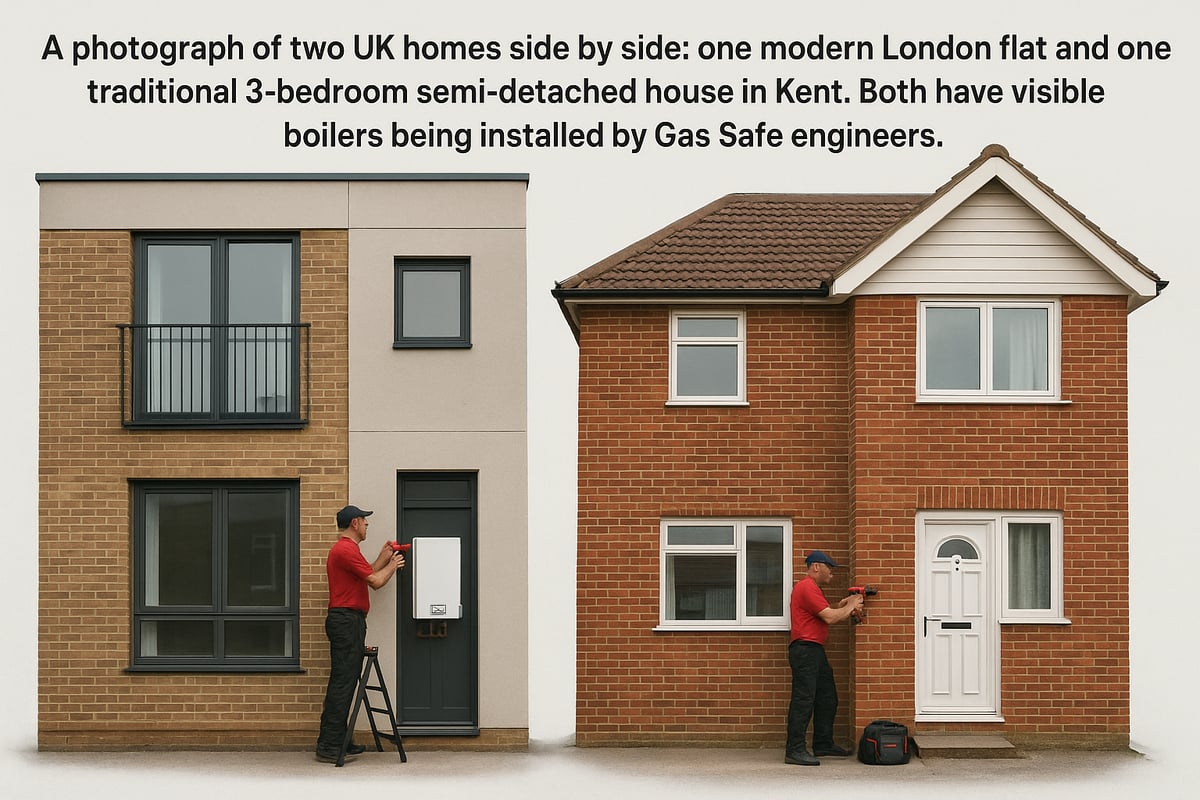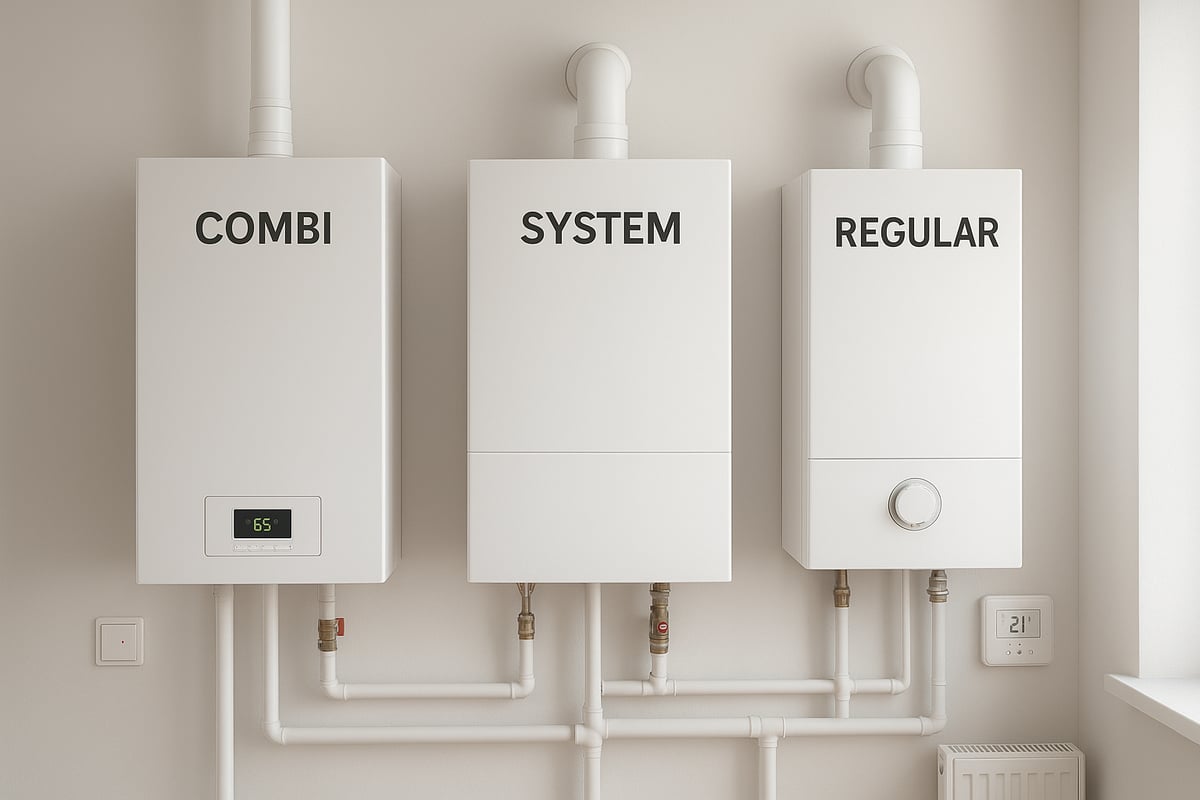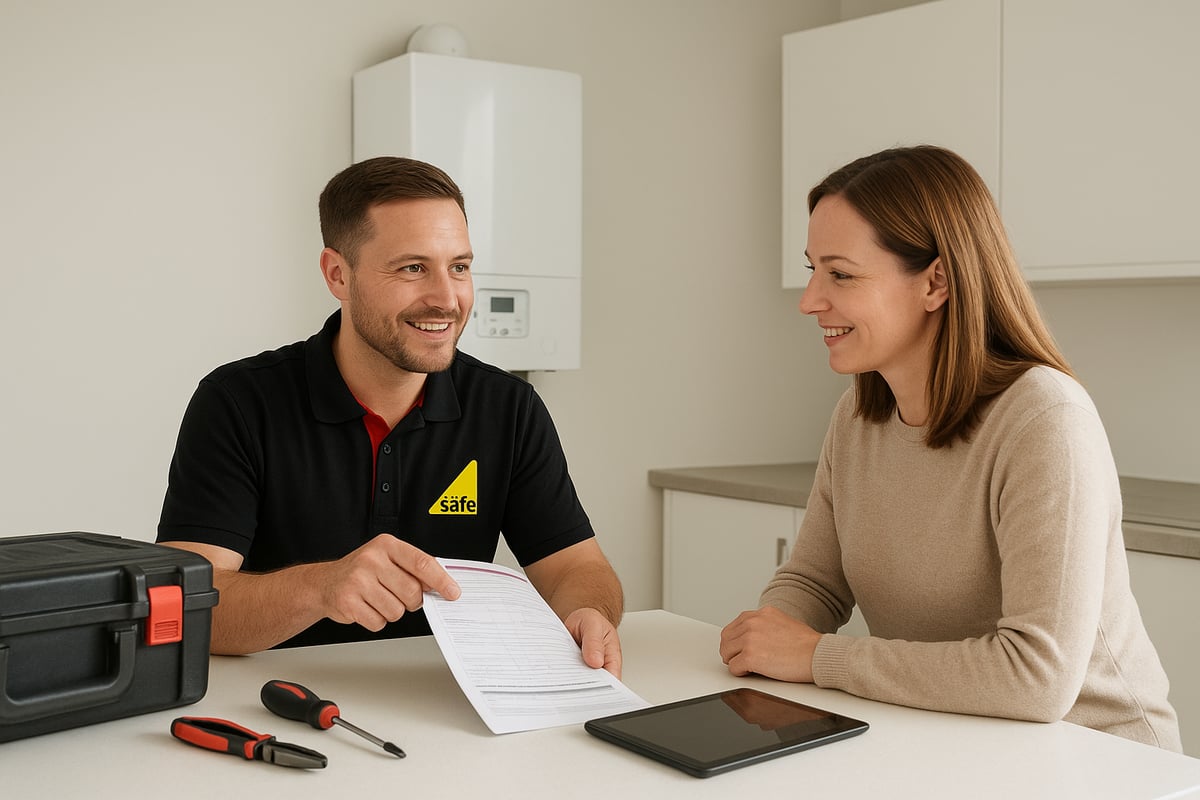Boiler Replacement Price Guide: Your 2025 Handbook
Efficient home heating matters more than ever as we head into 2025, with many households feeling the pressure of rising energy costs and unexpected boiler breakdowns. The boiler replacement price can be a source of confusion, adding financial stress to an already urgent situation.
If you are worried about what a new boiler might cost, or how to plan for a replacement, you are not alone. This handbook promises clear, current advice on everything from pricing and options to clever ways to save money.
Use this guide to take control of your boiler replacement journey. We will walk you through the key price factors, types of boilers, installation steps, hidden fees, financing options, and practical tips to maximise value.
Factors Influencing Boiler Replacement Prices in 2025
Choosing when and how to replace a boiler in 2025 is a big decision. The boiler replacement price can swing dramatically based on several important factors. Knowing what drives these costs helps you budget smartly and avoid nasty surprises.

Key Price Drivers and Regional Variations
The main elements affecting your boiler replacement price are the type of boiler, your property size, and where you live. For example, a combi boiler usually costs less to install than a system or conventional model. Bigger homes need larger, often pricier boilers.
Regional differences play a big part too. Labour and material costs in London or the South East are higher than in many other UK regions. Here is a quick comparison:
| Region | Typical Replacement Price (2024) |
|---|---|
| London | £3,200 – £4,000 |
| Kent | £2,700 – £3,500 |
| North West | £2,500 – £3,200 |
If you live in a city, expect to pay more for your boiler replacement price due to higher overheads and demand.
Energy Efficiency and 2025 Regulations
In 2025, all new boilers must meet stricter energy efficiency standards. Modern A-rated models may cost more upfront but can save you money in the long run. New government regulations also encourage low-carbon heating, which could influence your boiler replacement price if you opt for a heat pump or hydrogen-ready system.
Energy efficiency ratings not only impact your running costs but also your eligibility for grants or incentives. Staying up to date with these rules is vital for making a smart investment in 2025.
Labour, Installation Complexity, and Upgrades
Labour is another big slice of your boiler replacement price. Gas Safe registered engineers in the UK typically charge £40–£80 per hour. The complexity of your job makes a difference. If your new boiler needs extra pipework, system upgrades, or you want to move its location, costs quickly add up.
Sometimes, an old heating system needs a full flush or new radiators to work with a modern boiler. These upgrades are necessary for safety and performance but will increase your overall boiler replacement price.
Removal, Disposal, Brands, and Warranties
Don't forget about removal and disposal fees for your old boiler. Environmental rules mean safe disposal is a must, and this can add £100–£300 to your final bill.
Your choice of brand also matters. Premium brands come with longer warranties and advanced features, while budget models offer lower upfront boiler replacement price but may cost more to maintain. Always compare warranty terms, as a longer guarantee can save you money and stress later on.
Real-World Example and Price Statistics
To put it all together, let’s compare two common scenarios. Replacing a combi boiler in a 3-bedroom semi in Kent might set you back £2,800–£3,500. The same job in a London flat could reach £3,500–£4,000, mainly due to regional labour and access costs.
According to the UK Boiler Market Statistics and Trends, the average boiler replacement price in 2024 ranged from £2,500 to £4,000, with a projected increase of 5–10% for 2025. These numbers reflect rising material costs, new regulatory requirements, and a greater demand for high-efficiency systems.
Understanding these factors will help you plan your boiler replacement price for 2025 with confidence.
Types of Boilers and Their Price Ranges
Choosing the right boiler is key to managing your boiler replacement price, as different types suit different homes and budgets. In 2025, new technology and regulations are shaping what you can expect to pay. Let’s break down the main boiler types, their typical costs, and what each means for your home.

Combi Boilers
Combi boilers are the most popular choice in the UK, especially for smaller homes and flats. They provide hot water on demand, without the need for a separate tank or cylinder, making them ideal for properties with limited space.
The boiler replacement price for a combi system varies depending on brand, size, and features. In 2025, you can expect budget models to start from around £2,200, with mid-range options at £2,800 to £3,300, and premium models reaching £4,000 or more. Brands like Worcester Bosch, Vaillant, and Ideal remain top picks for reliability and efficiency.
Installation costs are usually lower for combi boilers, as there’s no need to fit extra tanks. However, if your home needs updated pipework or you’re switching from a regular boiler, expect the total boiler replacement price to rise.
Combi boilers typically achieve high energy efficiency ratings, helping to reduce running costs. They’re easier to maintain, and upgrades like smart controls can further cut bills. On the downside, combi systems may struggle to supply multiple showers at once in larger homes.
Curious about how costs break down for different combi units? For a detailed example, see this Combi boiler price breakdown.
Pros:
- Compact, saves space
- Fast hot water
- Lower installation costs
Cons:
- Not ideal for homes with high hot water demand
- Water pressure may drop with multiple taps
Combi boilers continue to grow in popularity, with many UK households choosing them for their blend of value and convenience.
System Boilers
System boilers are designed for larger homes, particularly those with multiple bathrooms. They work with a separate hot water cylinder, providing a steady supply for showers, baths, and taps running at the same time.
The boiler replacement price for a system boiler in 2025 generally starts at £2,600 for basic models, with most mid-range systems priced between £3,200 and £3,800. Premium models can go beyond £4,200, especially if you opt for a high-capacity cylinder or advanced controls. Brands such as Baxi, Viessmann, and Glow-worm are popular for their robust performance.
Installation is more complex compared to combi boilers, since a cylinder and sometimes extra pipework are needed. The overall boiler replacement price will also reflect any space modifications or upgrades to your heating system.
System boilers offer excellent performance for families, with minimal drops in water pressure even when several taps are used. They are more efficient than older regular systems, but require more space and regular cylinder maintenance.
Pros:
- Great for large households
- Consistent hot water supply
- Good energy efficiency
Cons:
- Needs space for cylinder
- Higher installation costs than combi
Compared to combi boilers, system models cost more upfront, but deliver better performance in busy homes.
Regular (Conventional) Boilers
Regular, or conventional, boilers are the traditional choice for older properties with existing cold water tanks and hot water cylinders. They are best suited to homes where the existing pipework and tanks are already in place.
The boiler replacement price for regular boilers in 2025 ranges from £2,400 for entry-level models to £3,800 for high-end systems. Top brands include Potterton, Ideal, and Vaillant. The cost can rise if you need to upgrade tanks, convert pipework, or improve insulation to meet new regulations.
Installation is often more complicated, especially if your system needs converting or modernising. This will increase the total boiler replacement price, so factor in all extra works when budgeting.
Regular boilers can have a long lifespan and are cost-effective in homes where the infrastructure already exists. However, they require more space, regular maintenance of tanks, and are less efficient than combi or system models if used in smaller properties.
Pros:
- Ideal for homes with existing tanks
- Good for low water pressure areas
- Long lifespan
Cons:
- Takes up more space
- Higher maintenance needs
- Less efficient for smaller homes
Replacing like for like is often most cost-effective if your home is already set up for a regular boiler, helping you avoid major upgrades and keep your boiler replacement price in check.
Step-by-Step Boiler Replacement Process and What to Expect
Replacing your boiler can seem daunting, but understanding the full process removes the guesswork. Knowing what to expect at each stage will help you plan, budget, and avoid surprises related to your boiler replacement price.
Let’s break down every step, so you feel confident about your journey from the initial quote to the final handover.

Step 1: Initial Assessment and Quotes
The first step in controlling your boiler replacement price is getting a proper assessment. A professional survey ensures your quote is accurate and tailored to your home’s needs.
During a home assessment, the engineer will inspect your current system, measure your property, and discuss your heating and hot water usage. Expect questions such as:
- How many bathrooms do you have?
- What is the age and size of your property?
- Are there any existing issues or concerns?
You can receive quotes in-person or online. An in-person visit provides more accuracy, but online quotes are useful for quick comparisons. Here’s a simple comparison:
| Quote Type | Accuracy | Speed | Personalisation |
|---|---|---|---|
| In-Person | High | Slower | High |
| Online | Medium | Fast | Medium |
Getting several quotes is wise. This helps you compare boiler replacement price points and spot any hidden fees. Always check what’s included before making a decision.
Step 2: Choosing the Right Boiler
Selecting the correct boiler impacts your comfort, efficiency, and the overall boiler replacement price. Start by assessing your property’s size, heating demands, and future needs.
Compare different boiler models and brands. Pay attention to:
- Warranty length and what it covers
- Energy efficiency ratings
- Reliability and customer reviews
Government regulations in 2025 will affect your choices. Many incentives encourage choosing high-efficiency or low-carbon options. The right choice often depends on your plans—are you renovating soon or expecting household changes?
Think about future-proofing. A slightly higher boiler replacement price for a more efficient model could mean lower bills over time. Consult your engineer for recommendations tailored to your home.
Step 3: Preparing for Installation Day
Preparation is key to keeping your project on time and your boiler replacement price within budget. Before your engineer arrives, clear access to your boiler and pipework, and make sure pets and valuables are out of the way.
Most installers will handle the system flush and safety checks, but you may need to:
- Ensure water and power supplies are easily accessible
- Confirm parking for the engineer’s vehicle
- Arrange time off if you need to be present
Set realistic expectations about the timeline. Most installations take 1–3 days, depending on complexity. Good communication with your installer helps avoid misunderstandings or delays, which can affect your boiler replacement price.
Step 4: Installation and System Upgrades
On installation day, your engineer will remove the old boiler, fit the new one, and make any necessary upgrades. This might include new pipework, radiators, or smart controls. The duration varies, but most jobs are finished within three days.
Safety is paramount, so expect thorough checks and Gas Safe certification before your system is signed off. Upgrading from a conventional to a combi boiler, for example, may take longer due to extra work involved.
For a detailed walkthrough of the typical timeline and process, see this Boiler installation process explained guide. Remember, added works or unexpected complications can increase your boiler replacement price, so always ask for updates if the scope changes.
Step 5: Final Checks, Handover, and Documentation
The final step ensures your new system works perfectly and you have all the paperwork needed for peace of mind and future support. Your engineer will test the system, demonstrate controls, and answer any questions.
You should receive:
- Building regulations certificate
- Warranty documents
- A service schedule or reminders
Post-installation support is crucial. If issues arise after installation, contact your installer promptly. Keeping documentation safe helps if you ever need to prove your boiler replacement price or warranty status.
A smooth handover marks the end of the process, leaving you with a reliable, efficient heating system and a clear understanding of your investment.
Hidden Costs and How to Avoid Them
When budgeting for a new boiler, many homeowners focus only on the headline figure. However, hidden costs often creep in, making the boiler replacement price higher than expected. Understanding these extras can help you plan better and avoid nasty surprises.

Common Hidden Costs in Boiler Replacement
Many costs are not included in the initial quote. To get a true boiler replacement price, watch out for:
- Flue changes: New boilers often need upgraded flues.
- Pipework upgrades: Old pipes may not suit modern systems.
- System cleaning: Powerflushing removes sludge, but adds to the bill.
- Disposal fees: Safely removing your old boiler or tanks can cost extra.
- Building regulations: Notification and certification fees apply.
- Water treatment: Inhibitors protect your new boiler but are rarely free.
These extras can quickly add hundreds to your boiler replacement price. Ask for a detailed breakdown before work begins.
Unexpected Complications: Real-Life Example
Let’s look at a real example. Sarah, a homeowner in Kent, received a quote for a new combi boiler. The initial boiler replacement price was £2,800. However, engineers discovered old pipework and a non-compliant flue. These hidden issues added £600 for pipe upgrades, £350 for a new flue, and £150 for powerflushing.
Her final bill reached £3,900, well above her original budget. This shows how vital it is to consider all possible extras when comparing quotes.
How to Avoid Surprises and Negotiate Better
You can protect yourself from hidden costs by taking a few smart steps:
- Request itemised quotes: Ask for every charge up front.
- Discuss potential complications: Find out what could increase your boiler replacement price.
- Get multiple quotes: Compare offers for transparency.
- Clarify disposal and certification fees: Know what’s included.
- Check ongoing servicing needs: After installation, annual servicing is vital and can be a hidden expense. For a breakdown of these costs, see the Boiler service UK cost guide.
Being proactive helps you avoid surprises and ensures the boiler replacement price stays within your budget.
Financing, Grants, and Payment Options for 2025
Navigating the financial side of a new boiler can feel daunting, but understanding your options is crucial for managing your boiler replacement price. Whether you’re looking to spread the cost or access government support, 2025 brings more choice and flexibility than ever.
Flexible Finance Options
Many households now opt for finance to make their boiler replacement price more manageable. Popular options in 2025 include:
- Interest-free credit for up to 2 years, ideal for those wanting to avoid extra charges.
- Buy now pay later schemes, which let you delay payments for several months.
- Personal loans from banks or credit unions, often with fixed monthly repayments.
You can explore a range of boiler finance and payment options to find a solution tailored to your budget and circumstances. Always check for any early repayment fees or hidden costs before committing.
Government Grants and Schemes
The UK government continues to support energy efficiency with several grant schemes that can reduce your boiler replacement price. The Boiler Upgrade Scheme, ECO4, and local council initiatives may offer grants or vouchers if you meet certain criteria, such as low income or upgrading to a greener system.
To check your eligibility and learn how to apply, visit the Government Boiler Replacement Grants 2025 page. Documentation, proof of benefits, and property assessments are usually required, so gather these in advance.
Finance vs. Upfront Payment
Should you finance your boiler or pay in full? Each route affects your overall boiler replacement price differently.
- Financing Pros: Spread the cost, keep savings intact, access higher-spec models.
- Financing Cons: Total cost may be higher due to interest, credit checks required.
- Upfront Pros: No interest charges, often eligible for discounts.
- Upfront Cons: Larger immediate outlay, less flexibility.
Example Repayment Breakdown
| Boiler Cost | Term | Interest Rate | Monthly Payment | Total Repayable |
|---|---|---|---|---|
| £3,000 | 36 months | 0% | £83.34 | £3,000 |
| £3,000 | 36 months | 7.9% APR | £93.86 | £3,379 |
Before signing any agreement, compare deals carefully and read the fine print. Avoid lenders who pressure you or charge high set-up fees.
Tips for a Smooth Application
- Check your credit score before applying.
- Gather paperwork: proof of income, ID, utility bills.
- Ask for an itemised quote that details your boiler replacement price.
- Be wary of deals that seem too good to be true.
By researching your options and understanding the support available, you can secure the best value for your boiler replacement price in 2025 and avoid unnecessary financial stress.
Maximising Value: Cost-Saving Tips and Long-Term Considerations
Maximising value from your boiler replacement price is about more than finding the lowest quote. It means making smart decisions at every stage, from choosing the right system to planning for the future. With energy bills rising and new regulations on the horizon, being informed can help you save both now and over the long term.
Here’s a quick overview of cost-saving strategies:
| Tip | Benefit | Estimated Savings |
|---|---|---|
| Choose the right boiler type | Fit for property, avoids waste | £100–£300/year |
| Invest in high-efficiency models | Lower bills, future-proofing | £200–£350/year |
| Regular servicing & extended warranty | Fewer breakdowns, lower repairs | £100–£250/year |
| Install smart heating controls | Smarter usage, more savings | £70–£150/year |
| Bundle upgrades with install | Discounts, less disruption | £100–£500 one-off |
Choosing the Right Boiler and Installer
Your first step in maximising value is making sure your boiler suits your property and lifestyle. Think about the number of bathrooms, hot water usage, and future needs. A combi might work for a small flat, while a system or regular boiler is better for larger homes.
Selecting a reputable installer is equally important. Look for Gas Safe registration, strong local reviews, and clear, itemised quotes. A trustworthy engineer will help you avoid unnecessary costs and get the best boiler replacement price for your situation.
Investing in Efficiency and Smart Controls
Upgrading to a high-efficiency, A-rated model can significantly lower your bills. While the upfront boiler replacement price may be higher, the long-term savings quickly add up. For example, switching from a G-rated to an A-rated boiler can save a typical UK household up to £350 a year.
Smart heating controls are another way to reduce costs. These let you schedule heating, control temperatures room by room, and even manage your system from your phone. Over time, this level of control means you only use what you need, keeping your running costs in check.
Maintenance, Warranties, and Bundling Upgrades
Once your new boiler is in place, regular servicing is vital. Annual checks keep your system running efficiently and help you avoid costly breakdowns. Many manufacturers offer extended warranties, providing extra peace of mind for a reasonable increase in boiler replacement price.
Consider bundling additional upgrades, like new radiators or water treatment, with your installation. Installers often offer discounts for combined jobs, which can lower your overall costs and reduce disruption to your home.
Planning for the Future: Regulations and Low-Carbon Options
Thinking ahead is key to getting the most from your investment. With stricter energy rules coming in 2025, choosing a boiler that meets or exceeds new standards will protect you from future upgrade costs.
If you’re considering low-carbon heating, check if you qualify for grants such as the Boiler Upgrade Scheme Increases to £7,500. This scheme can make switching to heat pumps or other eco-friendly options much more affordable. Stay informed about Government Plans for Home Energy Efficiency 2025 to ensure your choices align with future incentives and regulations.
By weighing all these factors, you can secure the best possible boiler replacement price while future-proofing your home and budget.
Now that you’ve got a clear picture of what affects boiler replacement prices in 2025, and you know the steps to make the most of your investment, you’re well on your way to a warmer, more efficient home. If you’re still unsure about your options or want a personalised quote from a team you can trust, why not reach out to Castle Heating Kent? Their experienced, Gas Safe registered engineers are always happy to help you find the right solution for your property. Give them a ring at Call Now on 01634790511 or 0800 0016511 and take the next step towards hassle free heating.

